Mail of Russia: in e-commerce-future with cautious optimism

In May 2016, a resident of the city of Tomsk received a letter sent 40 years ago. Her brother (then 9 years old) asked to send a compass to study, was interested in, as usual, affairs and weather. For 40 years, the letter turned yellow and dusty in the corner of the forgotten branch of all and waited for this unknown bona fide postman. Or, in the light of the latest “postal” changes, and not the postman at all, but the reform of the entire system.
It is not customary to say positive things about the Post of Russia, as it often embodies archaic, wretchedness and other, very unpleasant phenomena that originated in the same 70s (however, they were relatively progressive at that time). And yet in recent years, the Post of Russia itself begins to speak well of itself for us. And at the same time trying to match what is more important. Her words and deeds and all stereotypes related to FSUE will be discussed in the article.
')
It became interesting for us, the association that works in the b2b segment and, above all, with e-commerce projects, all the more so since Japanese technologically advanced people have started talking about the achievements of Russian post.
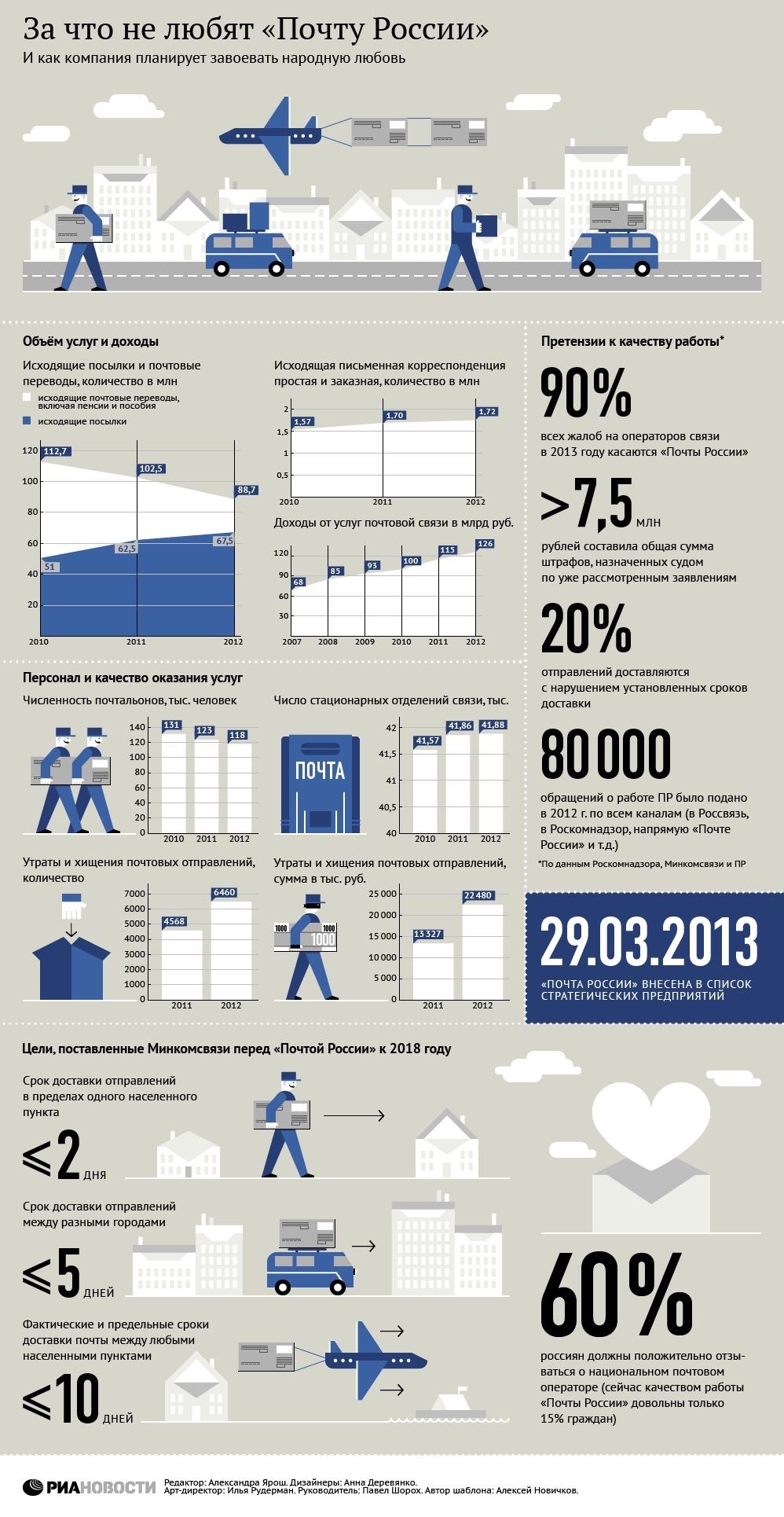
About archaic
If the Russian Post were archaic, it would be led by a grandmother from the same distant 70s. Of course, this is not an indicator. Even with a young and promising person in an expensive suit, inner, meaningful progressiveness may be absent. But look at the current CEO Dmitry Strashnov and his predecessor Alexander Kiselev. Wikipedia calls the first one a very unsuccessful Postmaster; there is no detailed information about the second one, except for references to the scandal and his resignation. These conclusions, judging by the results achieved by them, are not quite logical. Because under Kiselev, the Post of Russia for the first time since 2005 became a profitable enterprise. But under Strashnov, it made a powerful breakthrough in e-commerce and continues to grow.
Kiselev took the first step forward in the Mail. Being a man of science and bureaucracy, having created a name for himself in the Academy of Sciences and in various ministries and departments of the executive power, he even approached the case with the inherent “administrativeism” of such persons. During his rule from 2009 to 2013, no particular innovations appeared. Kiselev tried to organize a hierarchy and order based on it (with him the most ridiculous coincidence in the Russian general decentralization of the 90s was completely eliminated - the postal service of the Tatar State independently existed at the center. Almost as in the times of Ivan the Terrible). And even by some miracle that did not depend, the truth was from his hand (the name of that miracle is the growing volume of parcels from China), brought the Post for the first time since 2005 to a small plus.
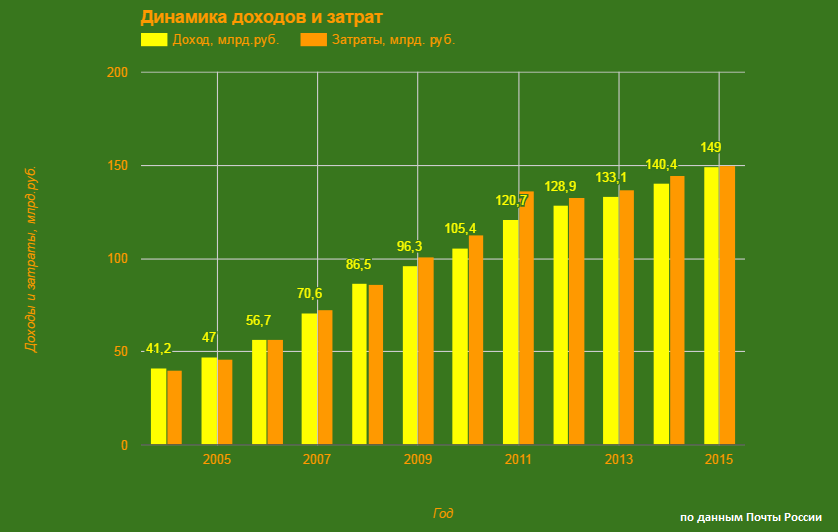
But this is a miracle and ruined the bureaucratic and administrative attempts Kiselev. The collapse at airports caused by the increase in the number of parcels from China, the dispute between the Post and the customs, the lengthy sorting process and the complete lack of automation, led the CEO to resign . It is worth adding one more achievement of Kiselev. This is the development of a strategic development plan until 2020, with the need to invest 220 billion rubles. However, this plan was ordered from the Boston Consulting Group , which once again speaks of the complete incompetence of our analysts or the wrong approach in choosing partners. Think about it - Americans strategically develop our Mail!
Dmitry Strashnov is a completely different person. A businessman from a young age. Able to see development prospects even in the most adverse conditions. The track record includes such well-known brands like Electrolux, Philips, Tele2. First of all, he immediately took up the automation of the screening process, and in November 2013, an automated screening center was commissioned.
In addition, as an advanced person, D. Strashnov was engaged in promoting Mail in the e-commerce market.
About innovations
Back in 2003, the Post of Russia stepped a couple of centimeters closer to development by organizing retail in all branches.
The following year, the company introduced EMS (international express delivery service), as well as CyberMoney, entering the electronic transfer market.
In 2007, together with Kodak and Rambler, she organized a photo printing service, and also entered the cross-border remittance market in China.
Then, before Strashnov arrived, there was a period of stagnation and without innovation - not a single significant new product or service.
Since 2014, Russian Post has been actively developing its own market place.
But 2015 turned out to be the most productive:
- Direct mail service;
- subscription online agency for regional publishers;
- new services “Courier Online” and “Package Online”;
- tracking service to track shipments from online stores;
- A new service site, not an informational one;
- Mail Bank, which will be discussed in more detail below.
And in 2016, the Post of Russia moved to a new, reactive level.
First, she rented two aircraft for super express delivery.
Secondly, it announced its intention to use blockchain technology to track shipments. In addition, the head of the “Mail Bank” Dmitry Rudenko actively supports the specified decentralized technology and even the emergence of crypto-money in Russia, since the delivery of the national currency to remote parts of Russia is sometimes more expensive than the currency itself, and this step is necessary.
Overall, Mail's e-commerce achievements are impressive. Revenue is growing every year at a substantial interest, and the profits are invested in new promising projects. However, these impressions, however, radiate so far only the b2b-community, at the level of an ordinary user, the stereotype is still working, supported by various scandalous incidents, which we shall say immediately after the Post Bank.
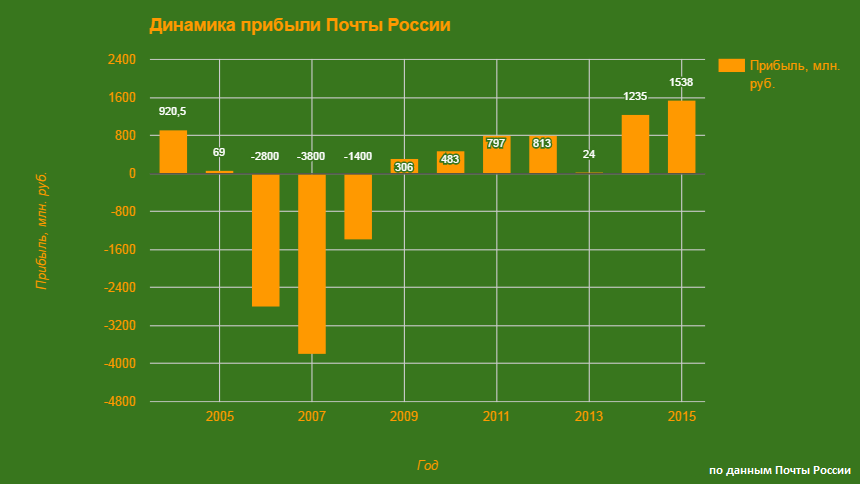
About “Mail Bank”
We started to talk seriously about the organization in the post offices of the bank back in 2009, although it was possible to think much earlier. An extensive category of pensioners who receive their “hard-earned” money at the post office and save most of them on savings accounts have long been asking for a source of additional income.
In 2010, Svyaz-Bank, sanitized by VEB, began to look for a partner for itself, since the calculated amount of investments of $ 5-10 billion did not allow the road going alone. Partners were listed as Bank of Moscow, Russia-Bank, Russian Standard, Unicredit-Bank, Nomos-Bank, HKF Bank, and Bank Tinkoff. However, it was not possible to agree, as a result, only 5 years later, we managed to realize our plans, but already with another bank - VTB. Moreover, the size of the investment has fabulously reduced to 5 billion rubles already (the amount of the acquisition of the Summer Bank, on the basis of which Pochta Bank was created), which makes it possible to clearly understand the reason for the previously broken transaction (in such projects there is no other reason - the greed of one of the parties). Having mastered the new source of income, Russian Post has made it, in fact, one of the main (more than 33% of the revenue comes from financial services).
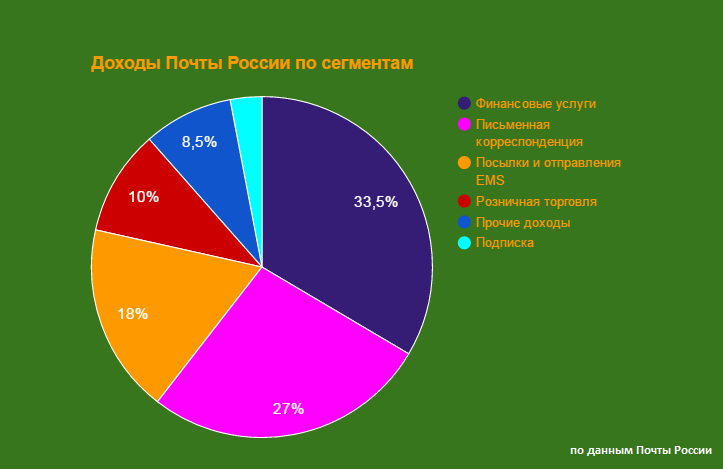
About wretchedness
If the Russian Post were poor, it would have looked like this hut.

The wretchedness of the Post is manifested in such tiny settlements, to which recent windfall profits are unlikely to reach in the next 5 years. Unlike the branches of the same “Sberbank”, which cares for each of its premises, which, however, has a profit margin, compared with the “super incomes” of the Post, it exceeds n times. While Mail is not able to take care of each of its home. In the same centers with wretchedness everything is in order (it is not there):
This is in Sochi:
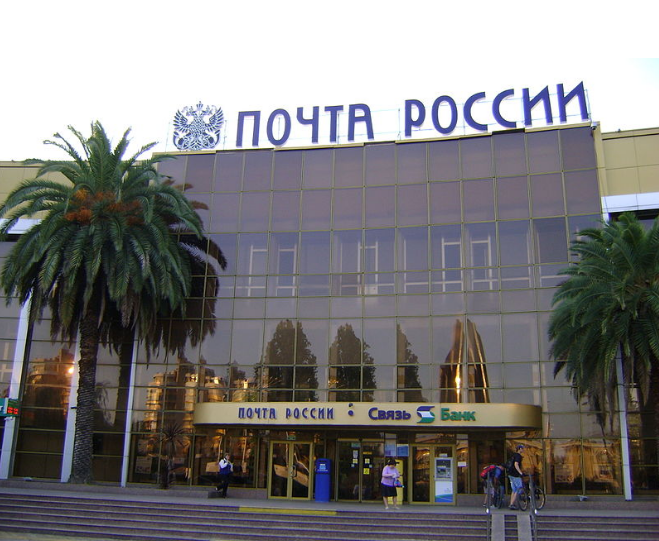
It is in every city:
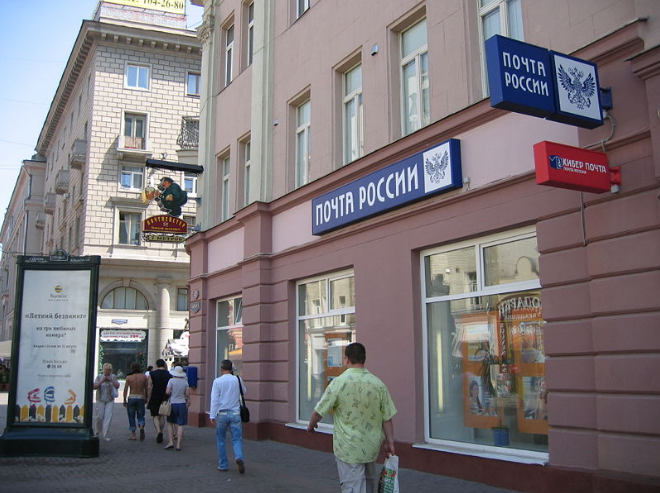
Pro speed
If the Russian Post were slow, it would ... and be slow. According to most reviews, even by their own admission.
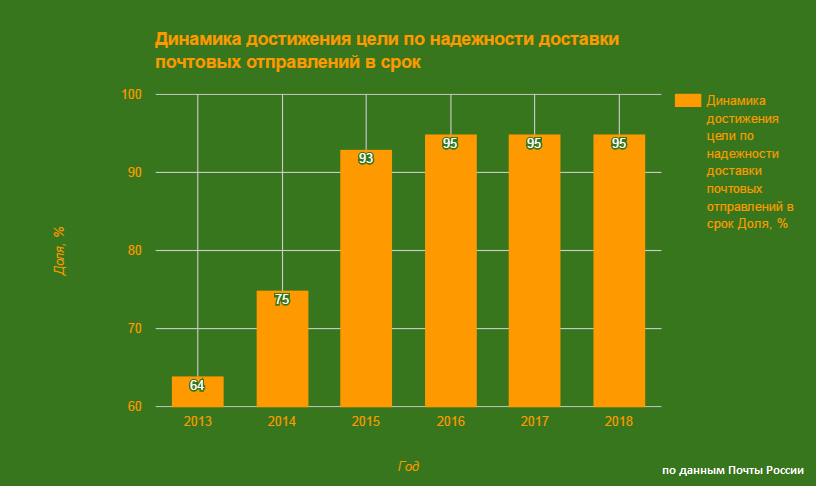
Although at present it is positioning a significant positive shift. In 2015, the rate of parcels delivered on time was 93% (from the projected 85%), this year the forecast is 95%. Reviews of ordinary users, however, complain about speed. In any case, the emergence of airplanes, the renewal of transport infrastructure, and the automation of the process turn the Post Office from a tortoise into a hare. One or two legs of this turtle, in any case, already hare.
About politeness and integrity
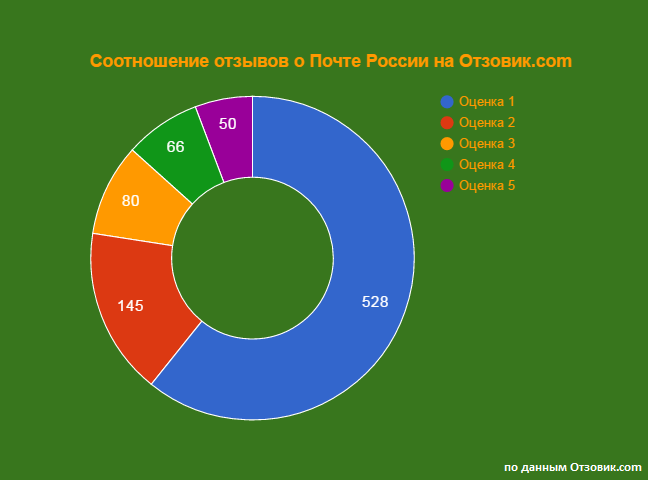
Reviews on the site irecommend.ru - average score: 1.9 (votes: 572).
Reviews according to the Russian Post - positive - 72%.
If with commercial shortcomings of the Post it is easy to do away with the infusion of additional funds and technological ideas, then the mentality of the ordinary postman changes hard. How to convince a gloomy, receiving a meager salary on the verge of minimal salary, an employee to say goodbye to the visitor with the words “All the best, come to us again”? Even those who are naturally polite can hardly cope with this gesture of kindness within the walls of an institution that is financially hostile to them. Even a pay rise will not fix it soon. Such projects, by the way, Mail is already implementing. For example, in 2016, it increased salaries to employees of the main production, until the end of the year it will take up to 6 billion rubles to pay salaries.
Where there is no external courtesy, there is internal ignorance rolls over, especially when such a person is left alone with himself, and someone else's package is next. If the cases of playing football in the workplace are only conjectures made as a result of the consideration of the delivered distorted package, then the burned letters become public. At the same time, we are not talking about the removal of a guilty employee, only disciplinary and administrative penalties. The cases of theft on the Post are also not unusual. That only costs the bricks recently sent to the Murmansk citizen instead of tablets.
About prospects
In the fog of obscurity, shrouding the Post of Russia from Soviet times, with the advent of Dmitry Strashnov, lines of bright prospects begin to emerge. If even the high-tech Japanese started talking about the achievements of the Russian post, then the picture should turn out to be really outstanding.
In 2015, Russian Post published a development strategy until 2018.
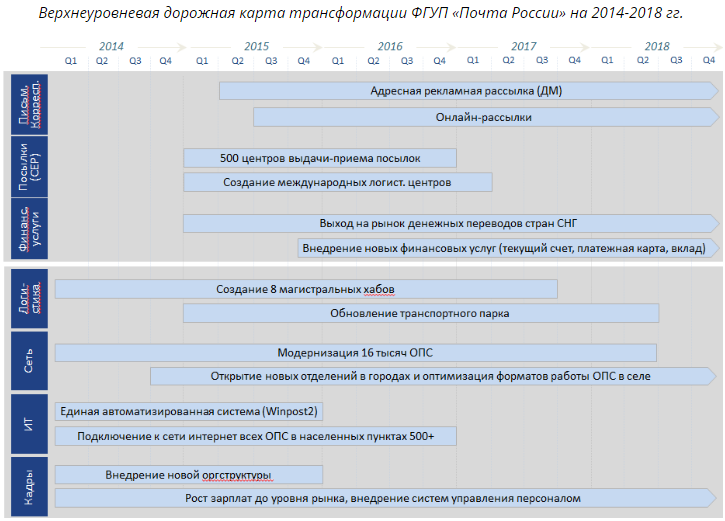
Until 2018, in accordance with this strategy, it was planned to invest 69 billion rubles in the development of the Post, of which:
in 2015 - 11 billion rubles;
in 2016 - 30 billion rubles;
in 2017 - 28 billion rubles.
On August 11, 2016, the development strategy of “Pocht-Bank” until 2023 was developed, in accordance with which “Pocht-Bank” is planned to be placed in the top three by this time, and this, for a moment, is a jump from 69th place and advancing such current competitors like Gazprombank, VTB24, Otkritie, Rosselkhozbank, Alfa-Bank and others.
By 2018, it is planned to open a logistics postal center in Khabarovsk to unload the rest and increase volumes. Plans for opening such a center were mentioned as early as 2013, with the deadline for completion of construction called at the end of 2017. The deadlines for these incarnations can be judged by looking at the LC projects in other cities:
- Moscow (Vnukovo - the first of the series - the plan - the 4th quarter of 2013, launched as planned in November 2013);
- Kazan (plan - 4 quarter of 2015, built by the end of 2016);
- St. Petersburg (modernization plan of the existing one - 2Q 2016, new plan - until the end of 2016);
- Rostov-on-Don (the plan is the 2nd quarter of 2016, they will actually start building at the end of 2016 and will be commissioned in 2017);
- Novosibirsk (the initial plan is Q3 2016, the final one is 2018);
- Ekaterinburg (plan - 2 quarter of 2017, even approximate dates are actually absent);
- Krasnoyarsk (the plan is Q3 2017, in fact, there is no information on approximate dates.
Meanwhile, the opening of additional logistics centers is necessary for the Post already now, like air, especially in the Far East, in order to eliminate unnecessary actions and costs with the movement of an increasing number of parcels from China to Moscow and back to Siberia and the Far East.

In 2015, Russian Post announced the privatization of the company, which is scheduled to be completed by 2018. On privatization, there is no talk yet, the state will remain the main and only shareholder.
And in every direction, be it blockchain, airplanes, or Pochta.Market, there is much to develop. And most importantly, there are opportunities for this, people are everything. It remains not to ruin.
Source: https://habr.com/ru/post/309320/
All Articles